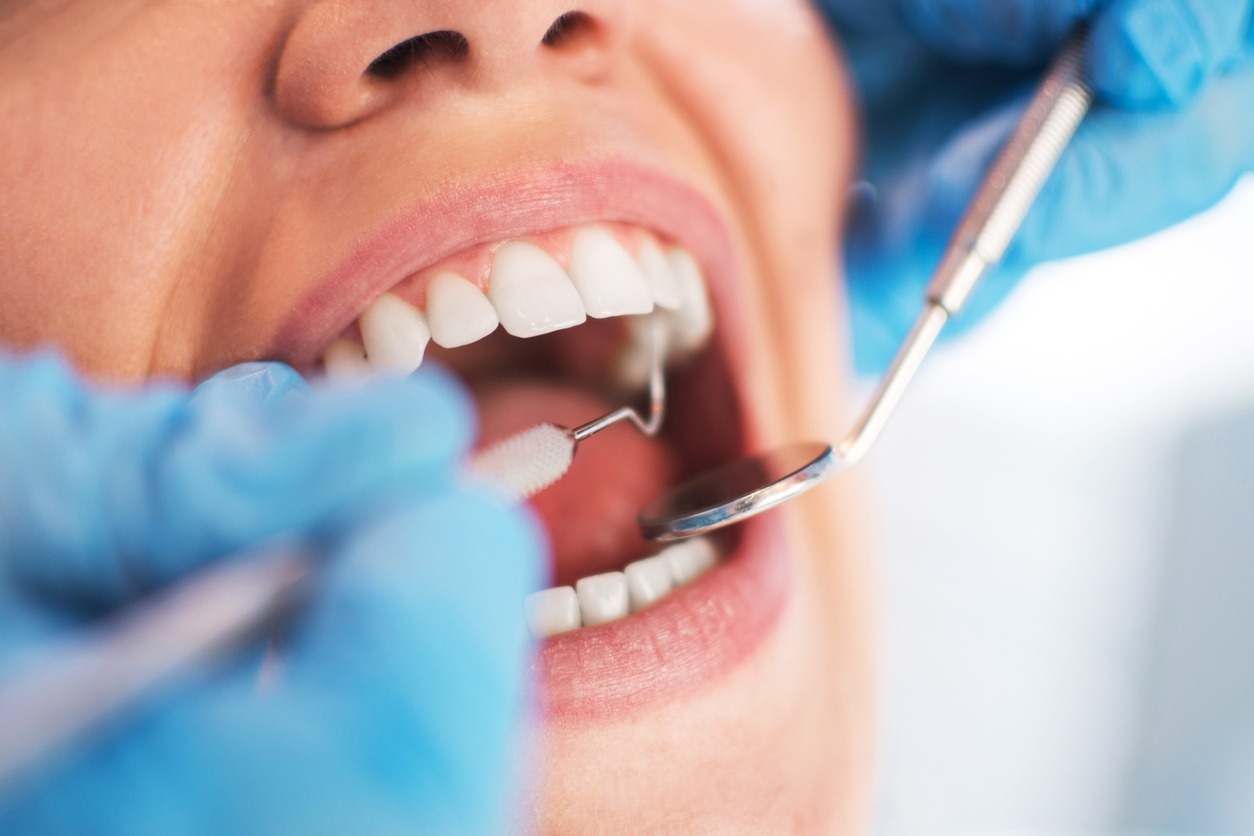Disclaimer: This article is for informational and educational purposes only and does not substitute professional medical advice. It is important to always consult a medical professional for any health issues.
Have you ever experienced a searing pain in your teeth after eating a spoonful of ice cream or sipping hot coffee? You might wonder if you have a cavity but, you’ve been so diligent when it comes to brushing and flossing your teeth each day. If you have been experiencing this but do not have any cavities after visiting your dentist, then you might be suffering from tooth sensitivity.
Many people experience having sensitive teeth. It occurs when the fluids within the dentine, which is the soft bit of the tooth under the enamel, are affected by cold, sweet, hot, or acidic substances. The sensation may range from a mild tingle to severe pain and discomfort, which trigger your nerve endings to fire.
Sensitive teeth won’t heal over time, and they should not be ignored. If you have been experiencing sharp pains in your teeth when you are eating, drinking, or brushing, there is a high possibility that you are suffering from tooth sensitivity. The best thing to do when you experience this is to visit your dentist immediately. If you want to learn more about what you can do, you’re in the right place. In this post, we are giving you some of the ways to deal with sensitive teeth.
What is Tooth Sensitivity?
In medical terms, tooth sensitivity is called dentin hypersensitivity or root sensitivity. If the teeth or a tooth is painful whenever a hot, cold, sweet, or acidic food and drink is consumed, or even when breathing in cold air, it means you are suffering from sensitive teeth. At first, it feels like a tingle, but later on, even a cold drink is enough to make you wince in pain.
Most of the time, having sensitive teeth is a short-term issue that may arise from brushing too hard, using certain dental products, and dietary issues. Tooth sensitivity can either be temporary or a chronic problem. It can distress one tooth, several teeth, or all of your teeth. There are also various causes of sensitive teeth, but most cases are easily treated with a change in oral hygiene regimen. [1]
People who have sensitive teeth may feel pain or discomfort due to certain triggers. It can be felt at the roots of the affected teeth. Some of the most common triggers for tooth sensitivity include hot foods and drinks, cold foods and drinks, cold air, sweet foods and drinks, acidic foods and drinks, cold water during dental cleanings, brushing or flossing teeth, and alcohol-based mouth rinses. The symptoms of tooth sensitivity may also come and go over time for no obvious reason, and the pain may range from mild to intense. [1]
Causes of Tooth Sensitivity
There are people who have more sensitive teeth compared to others due to having thinner enamel. The enamel pertains to the outer layer of the tooth that protects it. In a lot of cases, the enamel of the tooth can be worn down due to various reasons. Below are some of the most common causes of tooth sensitivity:
Worn Tooth Enamel
The enamel of the tooth can be worn down due to different reasons, such as brushing too hard, using a toothbrush with hard bristles, consuming acidic foods and drinks, clenching the teeth, and more.
Gum Recession
Normally, the gums of people shrink at the age of 40 or more. When this happens, the roots will be exposed and won’t have enamel to protect them, which causes sensitivity. Gum recession may also lead to gum disease. Therefore, it is important to inform your dentist about any changes to your gums.
Teeth Grinding
This is usually an involuntary action that occurs while a person is sleeping. Tooth grinding may also cause tooth sensitivity and other teeth problems.
Post Dental Treatment Sensitivity
If you have recently undergone a dental treatment, it may also leave your teeth feeling sensitive for a while. But tooth sensitivity caused by a post dental treatment is often temporary and will go away after a few days or weeks.
Tooth Decay
Cavities and other types of decay may also cause tooth sensitivity as they expose the dentin of the teeth that have nerve endings. This exposure may lead to pain and discomfort, which can make your teeth more sensitive.
There are also times when other conditions may lead to tooth sensitivity. For instance, gastroesophageal reflux (GERD) may cause acid to come up from the stomach and esophagus, which may wear down your teeth over time. In addition to that, conditions that cause frequent vomiting, such as gastroparesis and bulimia, may also cause acid to wear down the enamel. [1]
You may also check out our post about the Strongest Over-The-Counter Pain Medication for Toothaches for more recommendations.
How to Deal with Sensitive Teeth
There are indeed a lot of issues that may cause sensitive teeth. Luckily, there are various ways that are effective in reducing the sensitivity of your teeth. Some of them can be done easily at home. To learn more about these, below are some of the ways to deal with sensitive teeth:
Utilize Toothpaste Made for Sensitive Teeth
One of the best ways to reduce the sensitivity of your teeth is by using toothpaste that is specifically designed for treating sensitive teeth. The majority of them contain an ingredient that can fill tiny holes in the enamel and dentin temporarily. This way, the amount of exposure to the sensitive nerves of your teeth will be reduced. [2] There are many different options available in the market today when it comes to toothpaste for sensitive teeth. You can also ask your dentist for any product suggestion or recommendation that will work best for your case.
You may read our guide to Choosing the Best Toothpaste for Sensitive Teeth for more tips and recommendations.
Use a Toothbrush with Soft Bristles
If you are using a toothbrush with hard bristles, it is time to change it if you are experiencing tooth sensitivity. Stiff and abrasive bristles are hard on enamel, which may lead to more microscopic holes that may eventually cause more sensitivity. In addition to that, they may also worsen gum recession, which leads to exposed dentin and sensitive nerves. With this, it is better to use a soft-bristled toothbrush and ensure that you brush your teeth gently to preserve the surface of your teeth and maintain gum integrity. [2]
You may learn more about this in our guide to Choosing the Best Toothbrush for Sensitive Teeth.
Use a Mouthguard at Night
There are times when tooth sensitivity is caused by grinding the teeth at night, which is called bruxism. If this is the case, your dentist can mold your teeth and create a customized mouth guard that you can wear at night when you sleep. This can protect your teeth against pressure and avoids damage to teeth that can be caused by nighttime grinding.
Have Your Gums Checked
As mentioned earlier, diseased or receding gums is one of the major causes of tooth sensitivity. When the gum tissue collapses and moves away from the tooth surface, the parts of teeth that do not have enamel become exposed. This leaves nerves unprotected and may cause significant discomfort. With this, it is important to have your dentist examine your gums and ensure that you do not have gum disease that needs to be treated. Having healthy gums is important to make sure that your teeth are protected and prevent tooth sensitivity. [2]
Use a Salt Water Mouthwash
A mouthwash that is made out of salt and water may help reduce tooth sensitivity fast. It’s because salt water balances the pH level inside the mouth, which creates an alkaline environment that reduces bacterial growth. In addition to that, this type of mouthwash may also reduce plaque in the process. It is easily made by mixing two teaspoons of salt with one cup of warm water. It can be used in the morning and at night until sensitivity improves. [2]
Avoid Problematic Foods and Drinks
Some foods and drinks can make tooth sensitivity worse. Therefore, you should minimally consume them or avoid them entirely, if possible, in order to reduce sensitive teeth symptoms. These include acidic foods and drinks like coffee, pickles, and sodas. If your sensitive teeth are an issue when you eat, you may want to consider reducing or eliminating these foods. Aside from that, it is also best to avoid consuming foods and drinks that are very hot or cold, as they may also cause tooth discomfort.
Sensitive Teeth Treatments

In addition to the different ways to deal with sensitive teeth at home, it is also a good idea to visit your dentist as they may have better recommendations and treatments to offer, depending on your case. Below are some of the common treatments for tooth sensitivity:
Desensitizing Toothpaste
Applying desensitizing toothpaste several times may sometimes help block pain associated with tooth sensitivity. There are many products available that you can purchase over the counter, but it is best to ask your dentist about the best ones that might work for you.
Fluoride
Dentists may also apply fluoride to the sensitive areas of your teeth to make the tooth enamel strong and reduce the pain. They may also suggest the use of prescription fluoride at home, which is applied through a customized tray. [3]
Desensitizing or Bonding
Unprotected root surfaces can be treated by applying bonding resin to the sensitive root surfaces. For this treatment, the use of a local anesthetic might be needed.
Surgical Gum Graft
If the tooth has lost gum tissue, a small amount of gum tissue may be removed from elsewhere in your mouth and placed in the affected area. Doing this may help protect the exposed roots of the gums and reduce sensitivity. [3]
Root Canal
If your tooth sensitivity causes severe pain and other treatments you have tried are not effective, your dentist might recommend a root canal. This is a procedure that is used to treat problems in the soft core or dental pulp of the tooth. Even if it is a significant treatment for a lot of people, a root canal is considered the most positive method for eliminating tooth sensitivity. [3]
Conclusion
Tooth sensitivity is indeed an uncomfortable and painful dental issue. In order to prevent it from recurring, brushing your teeth twice daily using a soft-bristled toothbrush and fluoride toothpaste is a must. You also should not forget to floss your teeth once a day to remove the leftover food particles between your teeth. Also, when brushing your teeth, make sure that you use gentle strokes and avoid vigorous or harsh scrubbing to protect the enamel of your teeth. Tooth sensitivity is an issue that you should not ignore, and it is best to visit your dentist immediately for any pain that you feel in your gums and teeth. We hope this post helped you learn more about the different ways to deal with sensitive teeth.
References
[1] Gotter, A. (2018, September 29). Sensitive teeth: Causes, symptoms, treatments, and more. Healthline. Retrieved March 9, 2023, from https://www.healthline.com/health/sensitive-teeth
[2] Wesley, Z. J. (2023). 10 tips for dealing with sensitive teeth: Dentist in Brentwood, TN. Wesley Dentistry. Retrieved March 9, 2023, from https://www.wesleydentistry.com/10-tips-for-dealing-with-sensitive-teeth/
[3] Salinas, T. J. (2021, December 7). Treatments for sensitive teeth. Mayo Clinic. Retrieved March 9, 2023, from https://www.mayoclinic.org/healthy-lifestyle/adult-health/expert-answers/sensitive-teeth/faq-20057854




